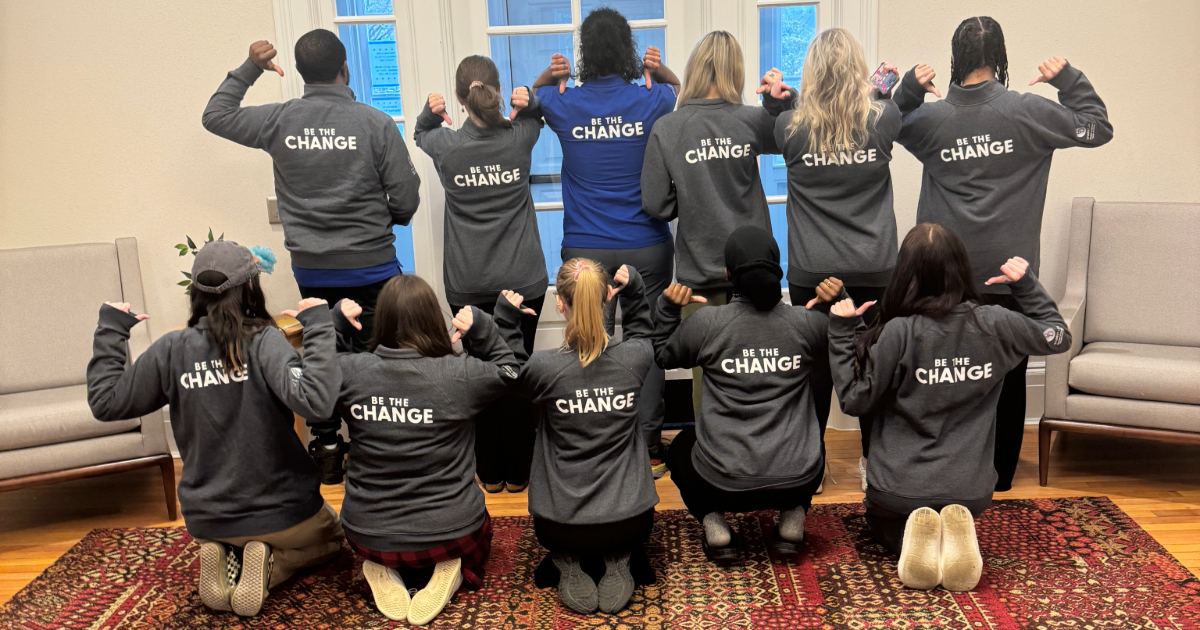

How Students Can “Be the Change” Through Bystander Intervention
April 01, 2024 Written by Jessica Downey | Photo provided by Joanne Sampson
April is Sexual Assault Awareness Month, and the Blue Hens CARE peer educators are spreading the word about bystander intervention strategies and how University of Delaware students can help “be the change.”
Bystander intervention is the act of stepping in when witnessing potentially harmful behaviors. The Blue Hens CARE acronym explains how you can intervene as a bystander when you:
- Create distraction
- Act directly
- Rally others
- Extend support
“Bystander intervention can be so many things,” said Blue Hens CARE peer educator Chloe Murphy, a junior fashion design and product innovation and fashion merchandising and management double major. “Intervention can be as simple as asking a friend to come home with you to pull them from an uncomfortable situation to as complex as becoming a support system for a person affected by sexual violence.”
This month, the Blue Hens CARE peer educators are utilizing the Be the Change campaign to show UD students just a few ways they can contribute to the safety and wellbeing of their fellow students. Look out for posters on campus detailing real situations where students have identified as bystanders.
“Examples of bystander intervention include speaking up when someone commits a microaggression or helping someone who is too intoxicated get to their friends,” said peer educator Olivia Massar, a senior political science and women and gender studies double major. “Any time where you recognize a harmful situation and take steps to stop violence from occurring, you’re being an active bystander.”
Sophomore peer educator and criminal justice major Chase O’Neal said students aren’t always quick to help others because of peer pressure.
“Students may be hesitant because they are afraid of the potential social repercussions of stepping in,” said O’Neal. “They don’t want to be seen as ‘uncool’ for stopping a dangerous situation. In reality though, a good friend won’t think you’re uncool for keeping another person safe.”
Massar added that students need to learn to identify potentially harmful situations in order to help.
“They may not recognize [these situations] as violent, they fear retaliation or they don’t believe they have to because no one else is intervening,” Massar said.
Sophomore peer educator and psychology and women and gender studies double major Megan MacWade attributed a lack of action to the “bystander effect,” which can be combated by rallying others.
“The bystander effect is the phenomenon in which people become less likely to intervene in the presence of other people,” said MacWade. “[I was at] a party with friends where two guys were surrounding a girl who looked visibly uncomfortable, so I asked my guy friend who was with me to come intervene. I felt the need to ask for additional support because I didn’t want to go into a situation with two men who were significantly larger than me.”
Senior criminal justice, psychology and women and gender studies major Abby Linthicum noted that not all attempts to intervene will be successful, so be prepared to try again.
“One time, I felt that a friend was too drunk to consent so I asked them to come play a game with me,” Linthicum said. “When that didn’t work, I asked the party host to intervene, though my friend backed out of the situation before that was necessary. This situation is a good example of how intervention is not always going to go the way we think, so it’s important to have a back-up plan and know different strategies.”
On Wednesday, April 24, the Blue Hens CARE peer educators are hosting the Spring Support Fair from 12 to 2 p.m. on the Central Green. The theme of the event is “consent” and students can engage with activities at tables being run by student organizations.
“UD students should attend the Spring Support Fair because it’s a great way to learn more about consent, intervention and healthy sexuality in a fun way through games, food and prizes,” said senior peer educator and human services major Jessica del Puerto.
The fair also presents the opportunity to talk with the Blue Hens CARE peer educators and ask any questions you might have about bystander intervention, violence prevention and other tough topics.
As a graduating senior, Linthicum said she hopes students will take what they learn from the fair and the Be the Change campaign and put these ideas into action.
“I’m leaving UD in just a few months, and I really hope to leave it just a little bit better and safer than it was when I got here,” said Linthicum. “I hope students learn how big of an impact they can make on the lives of those around them just by being more aware and willing to step in. I think students often feel that it isn’t their business to intervene, but it absolutely is. We are all part of the UD community and if someone in our community is in a harmful situation, it’s all of our business.”
